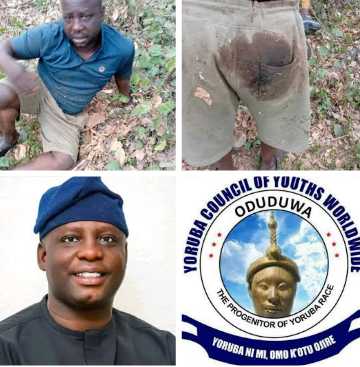After 12 Days in Captivity, Afenifere Youth Leader Eniola Ojajuni Walks Free
Emerging from a harrowing 12-day ordeal, Eniola Ojajuni, the National President of the Afenifere Youth Council, has been released from captivity, marking a significant relief for his family, colleagues, and the nation at large.
Ojajuni’s abduction occurred on February 17, 2025, while he was en route from Ondo State to Abuja for an official engagement. The assailants ambushed his vehicle near Akunu, a border town between Ondo and Kogi States, during which he sustained a gunshot wound to the buttock before being forcibly taken.
In the immediate aftermath, the kidnappers demanded a ransom of ₦100 million for his release. Disturbing visuals circulated on social media platforms showed a visibly injured Ojajuni pleading for assistance, underscoring the gravity of his situation.
The abduction prompted widespread condemnation and mobilized swift action from various quarters. The Nigerian Police Force intensified efforts to secure Ojajuni’s release, with the Inspector General of Police deploying the Intelligence Response Team to prioritize his rescue. Concurrently, Afenifere, the pan-Yoruba socio-political organization, urged the governments of Ondo and Kogi States, as well as relevant security agencies, to act promptly to ensure Ojajuni’s safety.
On March 1, 2025, Ojajuni was released, bringing an end to his 12-day captivity. Details regarding the conditions of his release, including whether a ransom was paid, remain undisclosed.
This incident has reignited discussions about the pervasive insecurity in Nigeria, particularly the rise in kidnappings targeting both prominent figures and ordinary citizens. The abduction and subsequent release of Ojajuni underscore the urgent need for comprehensive strategies to address these security challenges.
Ojajuni, a Lagos-born politician and activist, has been a vocal advocate for youth inclusion in governance and the protection of Yoruba cultural and political interests. His work with Afenifere positioned him at the forefront of campaigns calling for restructuring and greater regional autonomy, making him a well-known figure not just in political circles but among grassroots youth groups.
The incident comes at a politically sensitive time, as Nigeria’s political parties begin preparations for the next round of elections at state and national levels. Security has consistently ranked among Nigerians’ top concerns, and the abduction of a key youth leader in Afenifere—a group with deep historical roots in Yoruba political mobilization—could amplify calls for regional security strategies, including the strengthening of outfits like Amotekun, the South-West security network.
Although no official confirmation has been given, ransom payments have become a tragic norm in Nigeria’s kidnapping crisis. Families, organizations, and even state actors are often forced into difficult negotiations with criminal gangs who operate with near-impunity. In many cases, kidnappings are no longer purely political acts but part of an expanding economy of crime fueled by unemployment, weak policing, and porous borders.
The South-West’s reputation as one of Nigeria’s relatively safer regions has taken a hit in recent years, as incidents of highway robbery, kidnappings, and herder-farmer conflicts escalate. Analysts point to the economic implications as well—deteriorating security discourages investments in agriculture, tourism, and rural infrastructure development.
The abduction and eventual release of Eniola Ojajuni is not just another crime story; it is a stark reminder of how insecurity threatens Nigeria’s socio-political fabric. It raises broader questions about governance, the state’s monopoly on violence, and the fragile contract between citizens and the institutions meant to protect them.

